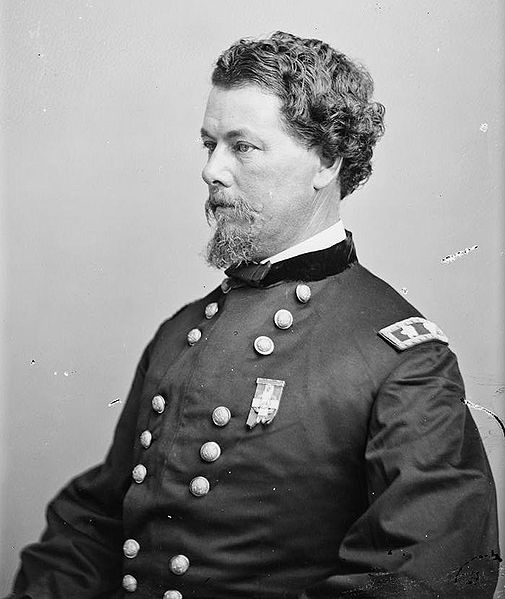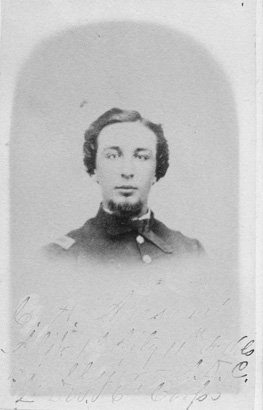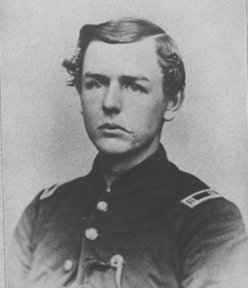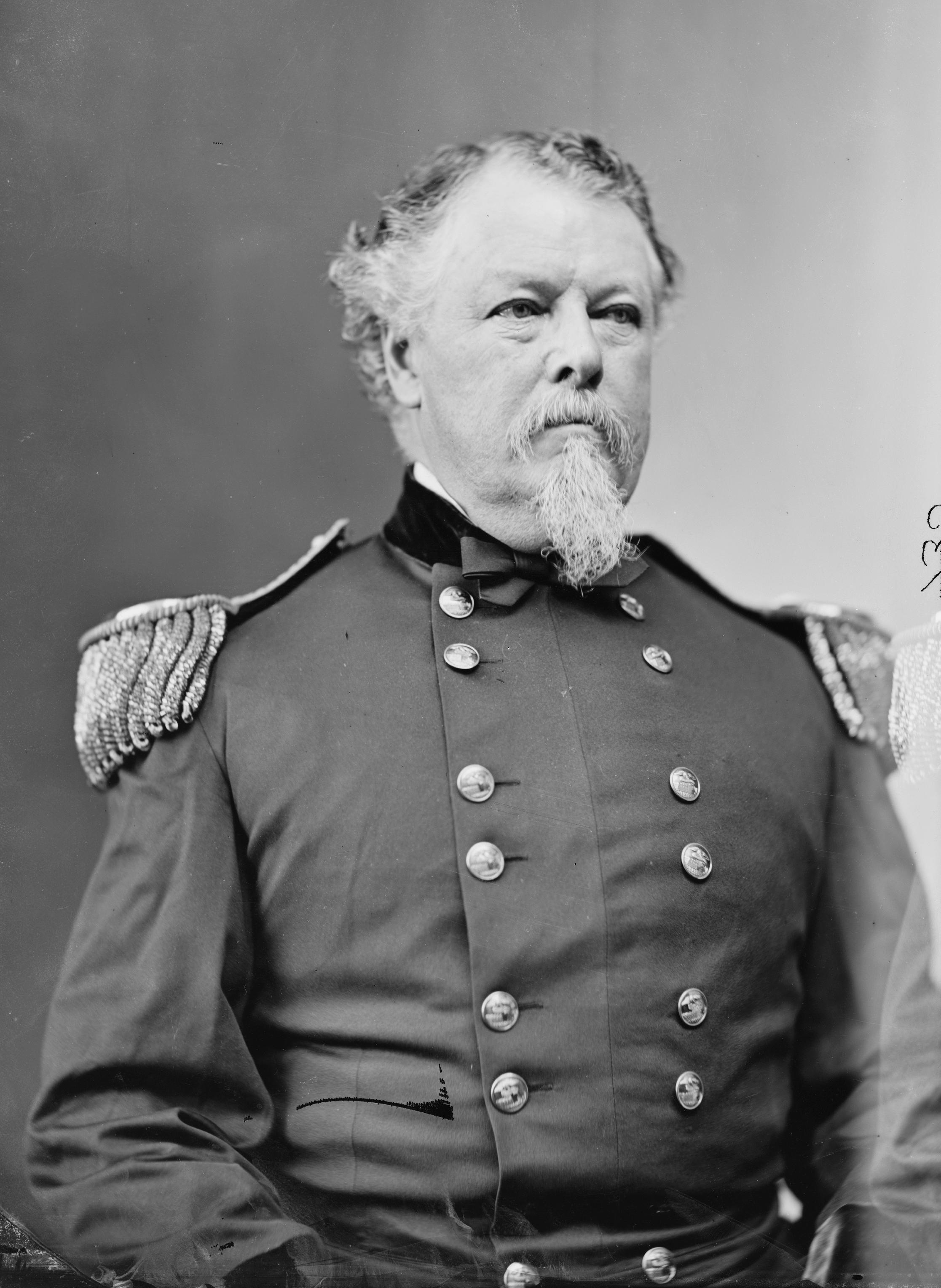Dinner with Charles Gould and Horatio Wright

I am always amazed at the amount of source material that is out there for historians who are willing to mine the depths of the treasure troves at our disposal. I had keyword searched “Fort Welch” on Newspapers.com in hopes of finding information about a Union mortar position nearby along Petersburg’s western front. I found nothing to help that project but the search delivered a hit in an article where a Vermont officer writes about a dinner he had at the Washington DC home of Capt. Charles Gould, a Medal of Honor Recipient who I discuss at length here on this blog, and VI Corps commander, Maj. Gen. Horatio G. Wright. Information on Wright is woefully lacking on the whole and I am always deeply interested in learning everything I can about the remarkable life of Capt. Gould. Thus an encounter between a general and two common soldiers thirty years after the war might be of interest so I have transcribed the article below. Originally published in the Chicago Times-Herald, the Burlington Free Press picked it up and ran it on May 7, 1896 with the mistitled headline – “Fifth Vermont Brigade.”

The following interview by Major Anson in Washington printed in the Chicago Times-Herald will have special interest for Vermonters:
“I was dining with Captain Charles G. Gould of the Fifth Vermont, a member of the famous Vermont brigade, who has been an examiner in the patent office for 20 years or more.
“By the way, Capt. Charley Gould is an interesting character. Let me tell you something about him. He was first a private in our regiment, the 11th Vt. While I was adjutant he was detailed as my clerk, and a month later made sergeant major, and shortly after that a second lieutenant of Co. G, and not very long after that he was promoted to a captaincy in the 5th. After dinner, while we were talking over war times, the captain’s wife said: ‘Charley, why don’t you show the major your medal?’ ‘Oh, never mind the medal, my dear,’ said the captain. ‘But I do mind it,’ I replied, and Mrs. Gould tripped upstairs and brought down a medal voted to her hero husband by Congress, together with a letter of transmittal written by our old brigade commander, Gen. L.A. Grant, who was assistant secretary of war under Harrison at the time the medal was voted. I guess Gould thinks as much of Gen. Grant’s letter as he does of the medal. As you know, not many of these medals have been distributed. When a soldier has one of them you may be sure he has performed some act out of the common. I knew that Charley Gould had done that.

“He won the medal in a charge on the confederate lines in front of Petersburg the morning of April 2, 1865. The Vermont brigade charged that portion of the line a little to the left of the Union Fort Welch. The 5th Vt. was the front regiment. As nearly as we have been able to ascertain, Capt. Gould was the first to reach the confederate works. He had a hand-to-hand conflict with one of the enemy, who speared him through the cheek with a bayonet and whom he shot with his revolver. At that moment another confederate struck him over the head with a musket and knocked him down on the confederate side of the works. Recovering himself and discovering that our forces had not yet taken the line, he attempted to climb to the Union side. One of his sergeants saw him and let his musket down for him to get hold of, and was pulling him up when a confederate caught hold of him and yanked him back, and gave his life for his pains, the sergeant dealing the fatal blow. While on the ground he was struck again with a bayonet on the back of the neck, just missing a vital point.
“By this time our forces had taken the works. Capt. Gould was, as we all supposed, fatally injured, having been twice bayonetted and once struck on the head, but he recovered, or partially so, and, as I said, has been on duty in the patent office for a long time.
“Capt. Gould went with me to call upon Major General H.G. Wright, who assumed command of the Sixth corps upon the death of Uncle John Sedgwick, which sorrowful event took place near Spottsylvania, Va., May 9, 1864, and retained command until the end of the war.”

[newspaper editor’s note: Sedgwick, a major general commanding a corps, was instantly killed on the picket line.]
“Do you remember General Wright; his ruddy face, brown curly hair, mustache and goatee? His hair is still curly, but, like the mustache and goatee, is as white as snow, for the general is past 76 years old, you know.
“The brave old leader gave us a warm welcome; said he was always glad to see any of the men who served with him in the glorious Sixth corps, and particularly well pleased to meet members of the Vermont brigade, which he regards as second to no brigade in the army in the world at any time. I noticed in his parlor a beautiful new silk flag, the Sixth corps headquarters emblem, and said, ‘General, I see you keep the old corps flag with you.’ ‘No, major, that is not the flag we had in the war. I got that made to keep in the parlor for my own pleasure and the benefit of the young people who call. Come with me, gentlemen, I have something to show you.’ And he led us to a corner of the sitting-room where, in a case, covered with glass, was another flag. ‘This gentlemen, is the dear old corps headquarters flag, the one which was with Sedgwick; the one you followed while I commanded the corps. It is old and faded, but very precious to me, as I know it is to you.’ ‘What would induce you to part with that flag, general?’ I asked. ‘Nothing can get that while I live. It speaks volumes to me every time I look at it. It was followed by as brave, heroic and patriotic a band of men as ever marched to battle. I recall those heroes of the long ago every time I look at it, and the older I get the more previous those thoughts are to me.’


“It was a delightful hour we spent with the dear old general. When we parted he thanked us for calling and said: ‘Whenever you are in the city be sure and come and see me. I cannot tell you how much it pleases me to meet my old soldier boys.’
“Dear old general! I wish he might live a thousand years. I saw in a paper, not long ago, that the last of the famous generals on the union side had passed away. That cannot be truthfully said so long as William S. Rosecrans, Daniel Sickles, Horatio G. Wright and George Getty are alive.
“General Wright planned some of the fortifications about Washington. This country never had a better fortified city than the capital was within a year from the first shot of the war. He returned to the engineer corps when the struggle was over, and when retired, twelve years ago, was at the head of that branch of the service, with the rank of brigadier general. He was truly enough one of the distinguished men of war time and commanded one of the grandest corps ever organized.”
Anson’s article ended here, another take on the popular Gould story and a glimpse at the elusive final commander of those who wore the Greek cross. Hopefully a Horatio Wright biography will eventually be published. Unfortunately I’ve seen only a few letters written by the general during the war. Perhaps his headquarters papers at the National Archives could yield sufficient information for a proper treatment of the commander.
As for the Gould portion of Anson’s article, the specifics of his wounding and rescue by Corporal Henry H. Recor (not a sergeant) do not perfectly match those written by Gould himself but are a close enough fit and regardless provide another intriguing wrinkle to the story.
Great article. Thanks for sharing. My Great-Great Grandfather served in the VI Corps all through the “Overland Campaign” in the 49th Pennsylvania Volunteer Infantry.
Do you know if he continued in service all the way through the end of the war, mustered out after his three years, or was among the many casualties suffered by that regiment during the Overland Campaign? Be sure to check out Sergeant Robert S. Westbrook’s fantastic day-by-day regimental history – History of the 49th Pennsylvania Volunteers.
Superb article; thanks for posting.
Good stuff!
Nicely done. Wright is one of those significant figures on the Union side who for some reason has never attracted the interest of a biographer. If I recall correctly, the best modern coverage is in one of the UNC/Gallagher essay books – might be another, however.
Wright’s two big moments are unfortunately overshadowed. Sheridan steals the credit for Cedar Creek and the Petersburg Breakthrough is lost within everything else occurring in April 1865. You’re right about his only real modern coverage. He is featured in William W. Bergen’s essay “The Other Hero of Cedar Creek” in the Gallagher, edited, Shenandoah Valley Campaign of 1864.
Wright’s early tenure as commander of VI Corps commander was inconsistent in the first few months. He seemed to find his footing under Sheridan in the Valley.
Got anything on your plate? (:
Actually he had an interesting career (like some of the other Union officers who had pre- and post-War engineering projects) – including the Washington Monument and the Brooklyn Bridge. Of course, I have no idea whether there are any meaningful collections of papers, correspondence, etc. That;s always been an obstacle to doing a biography of McDowell, for example.
I moved to Cincinnati years ago and volunteer at a CW Museum in Fort Wright, KY. As a life long CW buff, I had heard of Gen. Wright but knew little of him. I have done considerable research on the General and have portrayed him at CWRTs and numerous history minded groups as a living historian.
Second in his class at West Point in 1841, constructed Ft. Tyler and Ft . Jefferson / Dry Tirtugas for 10 years before the War. Replaced Sedgwick as commander of “ The Bloody Old Sixth Corps”. Amazing career until retirement in 1884 at mandatory age of 64. Buried at front steps of Lee’s Mansion at Arlington.